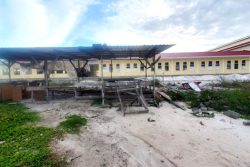In early 1990, Cheddi Jagan walked up the steps of the University of Guyana Social Science building, came to the dean’s office and requested that I agree to join the PPP/C slate for the elections that were due later that year. The elections were postponed until 1992, but over the intervening period, and particularly during the election campaign throughout the length and breadth of Guyana, we “cursed” the PNC and Desmond Hoyte. I was not the only UG employee to do this: others included the present Minister of Education, Shaik Baksh, the former Minister of Education, Dr. Dale Bisnauth, and former Minister of Finance, Saisnarine Kowlessar. I do not know if the Hoyte regime ever said or did anything to my other UG colleagues, but it left me alone.
 Not that there was any love lost between me and the PNC regime. In 1985, in collaboration with Colin Baber, then a lecturer at the University of Cardiff, Wales, I wrote a book that was very critical of the PNC regime and made an assessment of Mr. Hoyte that he did not like. Indeed, some colleagues at Cardiff University, where I was doing my PhD, warned me about coming back to Guyana having written such a book. Nevertheless, I returned and Hoyte immediately sacked me from the Kuru Kuru Co-operative College and blocked my working at the University of Guyana for about two years. Maybe or maybe not coincidentally, it was only a few days after an official from a foreign mission invited me to apply for a vacancy that UG also offered me a position.
Not that there was any love lost between me and the PNC regime. In 1985, in collaboration with Colin Baber, then a lecturer at the University of Cardiff, Wales, I wrote a book that was very critical of the PNC regime and made an assessment of Mr. Hoyte that he did not like. Indeed, some colleagues at Cardiff University, where I was doing my PhD, warned me about coming back to Guyana having written such a book. Nevertheless, I returned and Hoyte immediately sacked me from the Kuru Kuru Co-operative College and blocked my working at the University of Guyana for about two years. Maybe or maybe not coincidentally, it was only a few days after an official from a foreign mission invited me to apply for a vacancy that UG also offered me a position.
On that day in 1990, I said to Cheddi that I did not wish to be on any slate; that “my desk was my battlefield.” I had read the latter phrase somewhere, liked it and thought it appropriate, but Jagan was not amused. I had known Cheddi personally for some time and, as I have stated elsewhere, after the fall of the Berlin Wall I was perhaps one of the first persons to indicate to him that since communism had self-destructed, he was no longer a geopolitical threat and that with proper organisation he could win the election.
During our meeting Jagan chastised me, claiming that I was typical of the arm-chair intellectuals who only wanted to advise but not to get their hands dirty. In his usual polemical fashion, he claimed that universities should not be ivory towers, theory without practice was sterile, the welfare of the people must take precedence and so on and so forth. Although I did not buy all that he was selling, it occurred to me that I was, perhaps, indeed copping out. For various reasons, I believed that the PNC had to go and that the PPP needed to make itself broader-based, i.e. it needed Africans, business people, etc. I told Cheddi that I would have to speak to my family but I had anticipated his offer and knew that, if pressed, I would accede to his request.
In passing then, and contrary to what some would say, I did not begin collaborating with the PPP when it was in government or when there was “soup” to drink. Indeed, perhaps it is one measure of how far we have strayed from the Jagan doctrine, that it is believed that the PPP is there to provide “soup” for those who wish to feast. I can assure you that Jagan would have taken great umbrage to any supporters who sought to so denigrate his beloved party.
When I began to write this piece I had just read in Kaieteur News that I might be on some list of persons to be dismissed from UG. When you take the kind of positions I have taken in a country like ours, you have to expect anything, but I really thought that we had gone past this kind of behaviour. My first response was to check the facts with the University administration. I was informed that there was a list but that I was not on it because it did not apply to senior lecturers, or something of that sort. What this little matter indicates is either that the University administration was not open with the press and or that the press did not bother to check the facts.
Be that as it may, my contract, and I assume those of those on the controversial list, states that it could be terminated once the university gives three months notice, and so far as I am concerned the administration has the technical right to do this. The individual who offered the contracts was an agent of the University, the offers were accepted in good faith and therefore proper notice should be given. Further, the UG administration needs to take into consideration that lecturers cannot easily gain employment in the middle of the academic year. The University frowns upon lecturers who seek to leave it at mid-year and thus should avoid so behaving towards its employees. However, if the intention of the political administration is to remove lecturers who are critical of it, then this goes to the heart of the democratic process and is extremely retrograde.
I like to think of Guyana as being on a liberal democratic trajectory, even if we are not yet close to maturity. It is the open, transparent and relatively decent tendencies of the liberal democratic tradition that have allowed it to protect and propel itself to greater and greater things and it is behaviour that runs counter to this tradition that results in autocratic regimes imploding. We must not allow pre-1992 undemocratic behaviour to resurface.
But even if the intention was not to remove persons for political reasons, the liberal democratic tradition requires that we have in place fair and objective institutions to protect society and the individual and that we eschew the use of subjective administrative and political authority. For example, in this case we should have a proper judicial system to, among other things, deal with those who slander us. Institutions such as universities must have independent, open and transparent processes with which to conduct their business and deal with errant students and employees in an efficacious manner. It must be inappropriate to seek to crudely use political/administrative authority to rectify management errors.
That said, we must recognise, although not condone, that the kind of approach of which I speak comes from an open culture that is not easily fostered in societies such as ours where every issue is hotly contested within highly stratified boundaries, where every setback can be presented as a loss for an entire group and every win construed as the making of security. I am almost certain that no political party in a normal liberal democratic country would want the kind of quarrel that is taking place at UG on the eve of an election. This only happens in a context where support lines are thought sufficiently tight as to make any possible electoral repercussion minimal.







